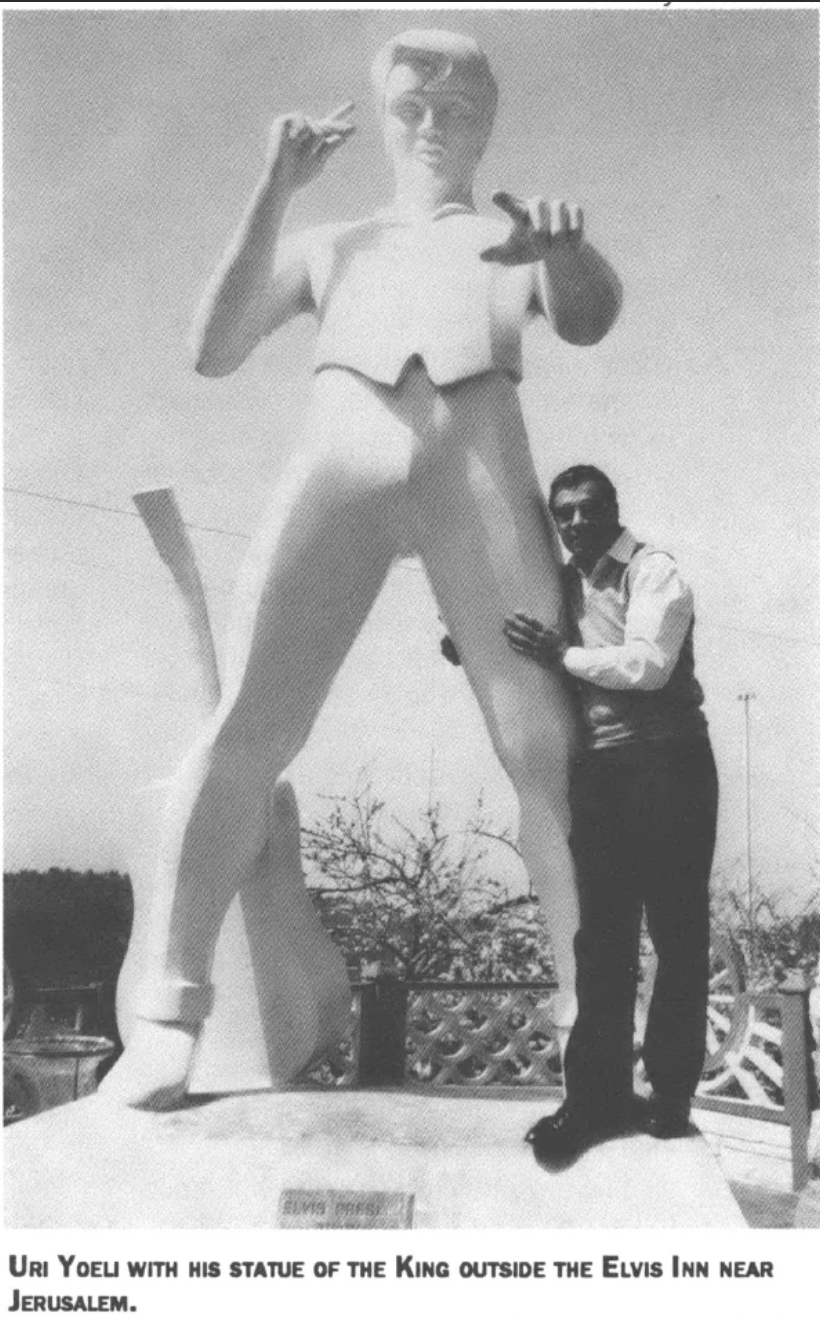
This article originally appeared in Southern Exposure Vol. 18 No. 2, "Birth Rights." Find more from that issue here.
Who built the pyramids? Elvis!
— Mojo Nixon, “Elvis Is Everywhere”
Neveh Ilan, Israel — Here in the Holy Land, on the road between Jerusalem and Tel Aviv, stands the largest statue of the King in the world. Resplendent in white, He is tall and majestic, much as He must have appeared to His followers in life.
The King has risen. The King of Rock ‘n’ Roll — Elvis.
Yea, verily, here in the Land of Milk and Honey the hip grinding god from Memphis stands immortalized in fiberglass outside a gas station and restaurant known as the Elvis Inn. It’s the fifth larger-than-life image of Presley in the world, the crown jewel in a collection of Elvis memorabilia unsurpassed anywhere in the world.
The person behind this shrine is Uri Yoeli, a seventh-generation Jerusalem businessman and head of the local Presley fan club.
The walls and ceiling of Yoeli’s restaurant are covered with photographs, posters, flags, and other Presley mementos. There are a staggering 728 pieces in all, a number Yoeli says surpasses even that of Graceland, the Elvis mansion in Memphis.
“Elvis came from a poor family, so there are only about 10 pictures from his youth, but I have them all,” Yoeli says.
The faithful journey from all over to see the 13-foot-high statue of the world-famous son of the South. Yoeli eagerly awaits the day when the King’s daughter, 25-year-old Lisa, will honor him with a visit. A friend who knows the manager of Graceland gave her an invitation from Yoeli, and she reportedly promised that one day she would make the trip to Israel.
Elvis Who?
The 43-year-old fan was 14 when he first discovered Elvis. His high-school girlfriend gave him Presley’s picture and told him Elvis was a big star in America. It was a moment that would change his life forever.
“I couldn’t even pronounce his name but I thought he was so beautiful,” Yoeli recalls. He hung the photo in his room where friends came often to admire it. Soon he was dressing like Elvis — collar turned up, hair brushed back, even imitating the famous smile.
Getting an Elvis album was no easy matter, however. In those days Jerusalem had only one small record shop. When Yoeli asked for an Elvis Presley disc, the puzzled salesman said, “Elvis who?” The young fan was sent to Tel Aviv — the big city — but even there, orders took months to cross the Atlantic.
A few months later Yoeli finally received his first Presley record: One Night. “I suddenly became a big man in Jerusalem,” Yoeli beams. “I had the first record of a new American singer — Elvis Presley.”
He and his buddies glued themselves to the phonograph and listened to the songs a thousand times. “We used to have dance parties where all we played were Elvis’s songs,” Yoeli sighs. “Those were the days.”
But not everyone shared Yoeli’s adoration of Elvis. Popular music-lovers in small-town Jerusalem were split between Elvis and Cliff Richards. “The Elvis guys were tough — very ‘macho.’” The Richards group was more conservative. Elvis fans grew up to be merchants and businessmen. Richards followers became doctors and lawyers.
The word on the Uri-Elvis love affair got out, and it wasn’t long before people were giving Yoeli whatever they had of the King — records, pictures, news clippings. “I was the address for Elvis in Jerusalem,” he recalls. “I collected everything I could find.”
Good for Business
When Yoeli took his first trip out of Israel in 1972, he headed for New York — to see Elvis. An Israeli friend living there told him his hero would be performing in Salt Lake City the next day.
“I didn’t know where that was,” says Yoeli. “I thought maybe a few miles from New York. So I said, ‘I’m going there. No problem!’”
Even when he learned Salt Lake City was hours away by plane, Yoeli wasn’t thrown. “I’ll be there,” he repeated — and he was. He and his friend reserved two tickets for Presley’s performance at the Salt Lake Palace.
Yoeli recalls his reaction to the concert. “I was like in a state of shock. I don’t remember anything specific about the show — only that it was fantastic. I couldn’t speak when I saw him.”
The two young men learned Elvis would be in Memphis a few days later and decided to go there too. They spent five or six hours in a hamburger joint known to be an Elvis favorite.
“Suddenly there came a big car.” Yoeli’s face lights up with the memory. “Elvis and his bodyguards — just 100 meters away. I begged them to let me shake his hand — that I had come all the way from Jerusalem to see him. Nothing doing. No one would let me get anywhere near him.” Heartbroken, Yoeli returned to Israel with only a picture to show for his efforts.
Life continued for Yoeli. He filled his room with a few hundred Presley photos. He married. His wife, not sharing his passion for Elvis, said “Take all your beautiful pictures and put them down in the basement. We’re going to start a new life.” The collection went into storage — but not for long.
Fifteen years ago when his restaurant was half its present size, Yoeli hung up three Presley posters. As customers admired them, he gradually added more. Soon he heard truck drivers telling each other, “I’ll meet you at the Elvis place.” It was called the Mountain Inn then. The people themselves changed the name.
“I saw I was not the only crazy person. There were more,” Yoeli laughs. Soon his whole collection was on display. Business was good and he doubled the size of the restaurant.
Newlyweds and Marines
Still, Yoeli wasn’t satisfied. “My dream had always been to see Elvis larger than life,” he says. “That’s how I viewed him.”
To fulfill his dream, Yoeli asked British sculptor Lance Hunter to fashion an image of Elvis. The artist liked the idea. He and his team worked with fiberglass and steel for two months, and last fall, there it was — a statue of the King, his hips thrust forward, his hair flipped back, a guitar leaning against one leg. It cost Yoeli a lot of money — “but it was worth it.”
“You can’t imagine how the public reacted the day we put it up,” he says. “It was unbelievable!” Newlyweds, following an Israeli custom that they have their picture taken at a famous place, flocked to the Inn to be photographed with Elvis.
Yoeli was thrilled. “A month ago, a woman came and put a lit candle at the base of the statue. I said, ‘Lady, please, we have a gas station here.’” She told him it was her dream to see Elvis.
Stories on Yoeli and his inn have appeared several times in Elvisly Yours, a British fan magazine. “Though Elvis has been dead 12 years, every month they publish pictures and stories of the King. I get letters from all over the world. Everyone likes to share their memories.”
“We have thousands of fans in Israel,” says Yoeli, “and two Elvis imitators — Ya’acov Tubi and Aryeh Golan — who come here with guitars and sing his songs. We get people without even any publicity. It’s all by word of mouth. We just sit around and talk Elvis. All my childhood friends as well as tourists pop in.”
Even the U.S. Marines know the hangout. “When they come to Israel, their first stop is the Elvis Inn. They take pictures of the rock star and listen to his records, which we play around the clock.”
Why so much attention to someone who has been dead for over a decade? Yoeli shakes his head. “Elvis isn’t dead,” he says. “He’s alive! He was something special. He returns us to the days of our youth!”
Tags
Rhoda Elovitz
Rhoda Elovitz is a freelance writer living in Jerusalem. (1990)

